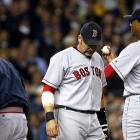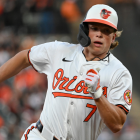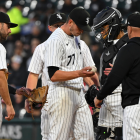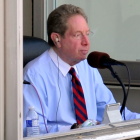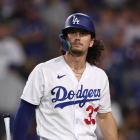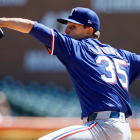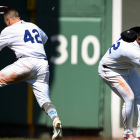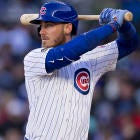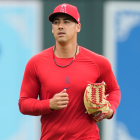There is more to being a sports fan than watching the action on the field. What actually happens is only part of the fun. Imagining what could have (or would have) happened is part of the fun as well. What if the 1994 strike never happened? What if Alex Rodriguez got traded to the Red Sox rather than the Yankees? There are countless great "what if" scenarios in baseball history.
With the 2020 baseball season still on hold, we're going to take this time to look back at the greatest "what ifs" of the 21st century for each American League team (We covered the National League here). We're limiting ourselves to the 2000s so the events are still fresh in our memories, and so we don't have to go back digging through more than a century of the game's history.
What if ...
... Buck Showalter used Zack Britton? The Orioles and Blue Jays sat tied 2-2 through five innings in the winner-take-all Wild Card Game in 2016. The sixth inning passed and Britton, who posted 0.54 ERA during the regular season, did not pitch. That made sense seeing how it was only the sixth. The seventh inning passed and again, no Britton. Understandable. The eighth inning? That's when you'd expect to see Britton stirring in the bullpen, but he again he didn't pitch. The ninth? Well, the score was still tied 2-2 and I get saving him for the save situation, but there might never be a save situation at that point. The tenth inning passed and there was still no Britton, and at this point it was unfathomable. "Put yourself in!" Adam Jones shouted to Britton from center field at the Rogers Centre. Britton never appeared in the game. Instead, Showalter put Ubaldo Jimenez on the mound in the 11th inning and three batters later Edwin Encarnacion hit a three-run walk-off home run to send the Blue Jays to the ALDS. For all we know Britton would've surrendered the walk-off hit, or tossed a scoreless inning(s) only for another reliever to give up a walk-off hit later in the game. But geez, wouldn't it have been nice to use the game's best reliever with the season on the line, Orioles fans? | |
... Grady Little pulled Pedro Martinez? The Curse of the Bambino was still in full effect heading into Game 7 of the 2003 ALCS. The Red Sox had not won a World Series since 1918 and they were trying to get over the hump and beat the Yankees. Pedro was brilliant for seven innings in Game 7, holding New York to two runs. Roger Clemens did not make it out of the fourth inning and Boston took a 5-2 lead into the eighth. Martinez had thrown 100 pitches up to that point and he started the eighth inning with a first-out pop-up. The inning unraveled after that. Derek Jeter doubled and Bernie Williams brought him home with a single, prompting Little to visit Pedro. Rather than pull a fatigued Martinez and go with a fresh reliever, Little stuck with his ace, and it cost him. Hideki Matsui and Jorge Posada followed with back-to-back doubles to tie the game. "Everything just piled up on top of us. I wanted to win. Grady wanted to find a way to win but he couldn't really trust what he had in the bullpen," Martinez said in 2018. New York tied the game with the three-run eighth inning and eventually won an Aaron Boone's walk-off home run in the 11th. Had Little pulled Pedro, maybe the bullpen blows the game anyway, and we all would've spent the last 17 years saying the manager should've stuck with the future Hall of Famer. A Game 7 win would've been monumental for the Red Sox at the time. That they got over the hump in 2004 (and have won four World Series titles since) softens the blow of 2003 a bit, I reckon. | |
... they'd kept Fernando Tatis Jr.? There are so many layers to the Tatis trade that make it so bad for the White Sox. For starters, they traded a promising young prospect before he ever played a game in their farm system. The White Sox signed Tatis out of the Dominican Republic in 2015 and traded him before he made his pro debut in 2016. They didn't even wait to see what he looked like on the diamond in a professional game. Secondly, the White Sox traded for James Shields in the middle of a collapse. They were 23-10 and six games up in the AL Central on May 9. When the Shields trade was completed on June 4, the White Sox were 29-27 and two games back. And third, Shields was not good with Chicago. He chewed innings and that's admirable, but a 5.31 ERA in 436 innings from 2016-18 is very bad. The White Sox made the trade to improve their rotation and stay in the race, and neither happened. Tatis has blossomed into the star -- he already has Shields beat 4.1 WAR to 0.1 WAR since the trade -- and one of the game's best young players. We have no idea how the rest of his career will play out, but this trade is already a huge loser for the White Sox. Just imagine if they'd kept Tatis. They'd have Tatis, Tim Anderson, and Yoan Moncada on the infield with Eloy Jimenez and Luis Robert in the outfield. Lordy. Young cores don't get any better. | |
... Carlos Carrasco hadn't gotten hurt? I was tempted to go with Grady Sizemore staying healthy. Gosh, what a ballplayer. Sizemore was basically Mookie Betts through age 25, that elite power/speed/defense player, then injuries struck and he was never the same. Sizemore is still only 37 and, had he stayed healthy, he could've been wrapping up a Hall of Fame career right now. He was that good and that talented. Instead, I'm going with Carrasco getting hurt in 2016, because the Indians were one win away from their first World Series title since 1948 despite having only three healthy starters in the postseason. Corey Kluber had to start Games 4 and 7 of the World Series on short rest, remember. Carrasco was sitting on a 3.32 ERA through 146 1/3 innings when he took a line drive to the pitching hand on Sept. 17 and suffered a broken bone, ending his season. Just a bad-luck injury. Nothing anyone could do about it. Pairing a healthy Carrasco with a not overworked Kluber (and Trevor Bauer and Josh Tomlin) in the postseason could've led to a very different World Series outcome. | |
... a lefty faced David Ortiz? The 2011-14 Tigers rostered three likely future Hall of Famers (Miguel Cabrera, Max Scherzer, Justin Verlander) plus several other All-Stars (Prince Fielder, Victor Martinez, David Price, etc.), yet they never did win a World Series. They reached the ALCS each year from 2011-13 and won the pennant in 2012, only to get swept by the Giants in the World Series. Such a talented roster with little to show for it. After taking Game 1 of the 2013 ALCS, the Tigers held a 5-1 lead going into the eighth inning of Game 2. Scherzer was excellent for seven innings, but the bullpen ran into some problems. Jose Veras, Drew Smyly, and Al Alburquerque loaded the bases with two outs for Big Papi. In came Joaquin Benoit and out went the baseball, with Torii Hunter flipping over the bullpen wall for maximum effect. Benoit was very good as Detroit's closer in 2013 (2.01 ERA in 67 innings) and his splitter made him particularly effective against lefties. Tigers manager Jim Leyland had lefty Phil Coke warming up in the bullpen though, and if Coke wasn't going to face Ortiz in that spot, what was the point of warming him up? "Coke hadn't pitched a big game for quite a while. Benoit is our guy against the lefties and we felt he gave us the best chance to get that out," Leyland said after the game. Keep in mind the Tigers had a four-run lead. Even if Ortiz cleared the bases with a double, the Tigers still would've had a lead and a good chance to win. Instead, the worst-case scenario played out, and the Red Sox walked off with a win in the ninth inning after Ortiz tied it in the eighth. Had Benoit (or Coke) held on in the eighth, the Tigers would've gone home to Detroit for Games 3-5 with a 2-0 series lead. That's much different than going back home with the series tied 1-1. | |
... they didn't cheat? Harsh? Yeah, a bit. Fair? Absolutely. The Astros employed an elaborate sign-stealing scheme during their World Series championship season in 2017, one that involved illegal cameras and banging on trash cans, among other things. MLB's investigation revealed the Astros continued to illegally steal signs during the postseason, and seeing how the Astros won five one-run games in October, you can't help but wonder whether one stolen sign swung the game. The 2017 Astros were so talented it was almost obnoxious. It's a damn shame they resorted to such a scheme because they might've won a title without it anyway, and now their championship is forever tainted. They have no one to blame but themselves. | |
... Alex Gordon went home? Of all the "what if" scenarios in this post, this is the one I most wish we had a chance to watch play out. With the Royals down 3-2 with two outs in the ninth inning of Game 7 of the 2014 World Series, Gordon shot a liner into the left field gap that Giants center fielder Gregor Blanco misplayed. The ball rolled to the wall, left fielder Juan Perez kicked it around, and Gordon made it to third base. Sure looks like Gordon had a chance to score on the play, no? Cutoff man Brandon Crawford was in shallow left field, well behind his usual shortstop position, and it would have taken a strong and accurate throw to get Gordon at the plate. For what it's worth, Gordon maintains he would have been out. "When I went home after the season, it was the first question that I was asked by everyone I met. 'Do you think you could have scored?' After a while, I stopped them before they even finished the question, and said, 'No, I couldn't have,'" Gordon told ESPN in spring training the next year. Safe or out, Gordon going home would've resulted in a top five World Series moment, I think. Either he gets thrown out at the plate to end the World Series, which would've been insane, or he ties the game with a two-out Little League home run, which would've been even more insane. I so desperately want to visit an alternate universe where Gordon goes home on the play and we see how it plays out. Would've been an incredible moment regardless of outcome. | |
... they re-signed Zack Greinke? The Zack Greinke, Los Angeles Angel, period was so brief that I sometimes forget all about it. The Brewers traded Greinke to the Angels at the 2011 deadline and he pitched to a 3.53 ERA in 13 starts. The Angels made an effort to re-sign Greinke after the season, but he ultimately headed north to the Dodgers on a six-year contract worth $147 million. The Angels responded by giving Josh Hamilton five years and $125 million, stealing him away from the AL West rival Rangers. It was a disaster. Hamilton put up an underwhelming .250/.307/.432 batting line with 21 home runs in 151 games in 2012, his first year with the Angels. Injuries limited him to 89 games in 2013, and things between the Angels and Hamilton got so bad that they essentially paid him to play for the Rangers in 2014. The Halos received 2.7 WAR in return for their $125 million investment. Greinke, meanwhile, continues to be an ageless wonder, and the Angels continue to be a starter or two short each year. At the time, Greinke carried less risk and fit the team's needs much better. The Angels paid the wrong guy. | |
... they'd kept David Ortiz? It is the sport's greatest "the one who got away" story of the 21st century. Big Papi hit .272/.339/.500 with 20 home runs as a 26-year-old with the Twins in 2002, and rather than give him a sizable raise through arbitration, Minnesota non-tendered him. They just let him become a free agent. The Red Sox pounced and Ortiz immediately became a transcendent superstar who helped Boston win three World Series titles. Ortiz is probably going to the Hall of Fame. The Twins, to their credit, were pretty good post-Ortiz. They won the AL Central in 2003, 2004, 2006, 2009, and 2010. They also lost in the ALDS all five of those seasons, including four times to the Yankees, a team Ortiz terrorized while with Boston. It wasn't until Jason Kubel emerged in 2008 that the Twins found a steady DH after dumping Ortiz, however. With Big Papi, maybe the Twins oust the Yankees in the ALDS at some point and push for a title. I know this much: there's little chance the Red Sox win as much as they did from 2003-16 without Ortiz. Minnesota's "what if" is Boston's "thank goodness." | |
... the Cliff Lee trade was completed? I was tempted to go with Mariano Rivera completing the 1-6-3 double play in the ninth inning of Game 7 of the 2001 World Series. Damian Miller laid down a bunt following Mark Grace's leadoff single and Rivera, who was an outstanding fielder throughout his career, threw the ball into center field, contributing to the D-Backs' comeback and walk-off win. Had Rivera completed the double play, the Yankees almost certainly win the game and their fourth straight World Series, and that's not nearly enough of a mystery. The Lee "what if" is far more fascinating. The Yankees, looking to repeat as World Series champions in 2010, tried to pry Lee away from the Mariners a few weeks prior to the deadline. Jesus Montero and two other prospects would've gone to Seattle in a trade that was "just about done."
The trade never did get done, however. The Mariners did not like the medical reports on one of the non-Montero prospects and backed out of the deal, and instead sent Lee to the Rangers for a package fronted by Justin Smoak. A few months later Lee and the Rangers beat the Yankees in six games in the ALCS. Lee struck out 13 and tossed eight scoreless innings in his Game 3 start. Had the Yankees been able to complete the Lee trade, they wouldn't have had to face him in the ALCS, increasing their chances of winning another title. Also, landing Lee might've given them a leg up on re-signing him after the season. Instead, he signed with the Phillies. And let's not forget Montero eventually went to the Mariners in the Michael Pineda trade. That deal doesn't happen if Montero goes in the Lee trade. Lots of layers to this one. The failed trade might've directly cost New York a title in 2010. | |
... Jeremy Giambi slid into home plate? Derek Jeter's Flip Play in Game 3 of the 2001 ALDS is one of the most famous defensive plays of the 21st century, and the context makes it even more impressive. The Yankees were down 0-2 in the series and nursing a 1-0 lead on the scoreboard when Terrance Long yanked a double into the right field corner at what was then called Network Associates Coliseum. The season was on the line for the three-time defending World Series champs. Giambi, who singled as the previous batter, chugged around third base and was tagged out at home after Jeter intercepted the throw -- Shane Spencer airmailed both cutoff men -- and shuffled the ball to Jorge Posada at the plate. Giambi went in standing up. It sure looks like he had a lane to slide under or around the tag. "Now that we know what happened, it's maybe I should've slid. If I slid and I was out, maybe the question would be, should I have run Posada over? And then I think, well, maybe I should've taken him out," Giambi told The Athletic earlier this year. If he slides and he's safe, the game is tied 1-1, and the Athletics maybe go on to win the series and advance to the ALCS. Then again, even after the Game 3 loss, the A's still had opportunities to win the series in Game 4 and 5, and were outscored 14-5 in the two losses. We could also spin this another way: why wasn't Giambi removed for a pinch-runner? Eric Byrnes was on the bench and the obvious pinch-runner candidate. Not pinch-running was understandable, though. There were already two outs in the inning, and it was only a one-run game. Giambi's lineup spot could have come up again -- it did, and he grounded out to end the game -- and, at the time, getting him the extra at-bat in a close game outweighed the benefit of the added speed at first base with two outs and the No. 7 hitter coming up. Or so I thought at the time. | |
... they'd kept Ken Griffey Jr.? Junior's desire to play close to home and his impending free agency led to the Feb. 2000 trade that sent him to the Reds for Mike Cameron and three others. Griffey reportedly blocked a trade to the Mets earlier in the offseason. "(If) he can't go to Cincinnati, then he's going back to Seattle for the final year of his contract," his agent, Brian Goldberg, said at the time. The game's biggest start had been traded in a February blockbuster. The Mariners did not have to trade Griffey, of course. The trade worked out well for them -- Cameron was very good and injuries hampered Griffey in the second half of his career -- but it wasn't necessary. Keeping Griffey in 2000 and letting him play out the final year on his deal was perfectly reasonable. Seattle went 91-71 that year and advanced to the ALCS, where they fell to the Yankees in six games. Griffey, meanwhile, authored a .271/.387/.556 batting line with 40 home runs for the Reds in 2000. Do the Mariners beat the Yankees in the ALCS with Griffey? The better question might be whether they win the AL West. Seattle finished a half-game behind the Athletics that year, and if Griffey nudged them into first place, the Mariners would've played the Yankees in the ALDS rather than the White Sox. Griffey is an icon in Seattle and will be forever, but I doubt anyone with the organization regrets the trade. It's still fun to ponder what would've happened in 2000 had he remained with the club. | |
... they signed Barry Bonds? The Rays have two excellent "what if" scenarios in their relatively brief history. Drafting Buster Posey with the No. 1 pick in the 2008 draft rather than Tim Beckham is an good one. With few exceptions (Toby Hall, Dioner Navarro), the Rays have had a revolving door behind the plate. Case in point: Tampa has used six different catchers the last six Opening Days. It's been an organizational weakness and Posey is one of the best catchers of his generation. As fun as it is to think about Posey in Tampa Bay, it doesn't beat the Bonds hypothetical. Bonds, then 42, hit .276/.480/.565 in 2007 and was essentially forced into retirement. He publicly offered to play for the minimum salary and it was reported at the time that the Rays considered signing him. Bonds would've stepped in at DH -- the Rays used 11 different players at DH that year, led by Cliff Floyd's 72 starts at the position -- and seeing how Tampa Bay went to the World Series that year, he might've helped put them over the top. I think Bonds in Tampa in 2008 is a much more fascinating "what if" than Posey starting his career with the Rays. | |
... Nelson Cruz had been replaced defensively? Endy Chavez thought he was going out to right field. With the Rangers nursing a 7-5 lead in Game 6 of the 2011 World Series and a championship three outs away, Chavez pinch-hit for the pitcher in the top of the ninth, but rather than replace Cruz in right field defensively as he'd done throughout the season, Chavez returned to the bench and Cruz stayed in the game. Five batters into the bottom of the ninth David Freese lifted a two-strike, two-out, two-run game-tying triple over Cruz's head. Chavez would later say he was surprised he didn't remain in the game for defense, though Rangers manager Ron Washington shot down speculation that Chavez was supposed to be in the game. "I don't remember anything like that. Any information you get further on that, let Endy Chavez tell you. I can't reflect back that far right now. You want the answer to that, go talk to Endy Chavez," Washington said the following year. Freese's ball was well-struck and it would not have been a routine play for any outfielder, but Chavez was a gifted defender, and he certainly would've had a better chance to make the play than Cruz. The "what if' in this scenario is pretty simple. If Chavez catches the ball, the game is over, and the Rangers are World Series champs. Texas did take a 9-7 lead in the tenth inning, though, and they blew that lead too, and then Freese hit a walk-off homer in the 11th. Plus there was Game 7. The Rangers still had plenty of opportunities to win that series even after Freese's triple over Cruz's (not Chavez's) head. | |
... Jose Bautista hit the cutoff man? Game 6 of the 2015 ALCS had a wild ending. With his team trailing 3-2 in the series and 3-1 in the top of the eighth inning of Game 6, Bautista slugged a game-tying two-run home run off Royals setup man Ryan Madson. Then the skies above Kauffman Stadium opened up. A 45-minute rain delay halted the game between the top and bottom of the eighth inning. When the game resumed Blue Jays manager John Gibbons went to closer Roberto Osuna against the top of the Royals lineup. Lorenzo Cain started the inning with an eight-pitch walk, then Eric Hosmer hooked a single to right field. Bautista retrieved the ball, spun around, and fired to second base. Cain, who had gone first to third on the play, was waved home by third base coach Mike Jirschele, who saw the errant throw. Cain scored from first on a single. It proved to be the winning run of the ALCS. "I felt I cut it off quick enough to where if I threw to second I would prevent (Hosmer) from going to second and Cain from scoring. Obviously, I was wrong," Bautista said after the game. Had he hit the cutoff man -- or even thrown home -- Bautista would've held Cain at third, keeping the score tied. Then again, Kansas City would've had runners on corners with no outs, and that's a pretty good situation. The odds of Cain scoring at some point were pretty high. Not 100 percent, but high. Also, it should be noted the Blue Jays had the tying run at third base with no outs in the top of the ninth. Wade Davis, who pitched before and after the rain delay, allowed a leadoff single to Russell Martin, and pinch-runner Dalton Pompey stole second and third. Davis struck out Dioner Navarro and Ben Revere, and got Josh Donaldson to ground out to strand the runner and end the series. Maybe that's the real "what if" scenario, the Blue Jays getting that runner home to tie the game and keep their season alive? Hmmm. | |




























